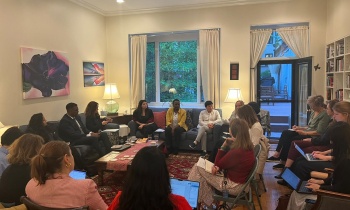QUNO NY Spotlights: Enhancing Women's Leadership in Peace Processes

Each October, shortly after the opening of the year’s General Assembly, the UN observes Women, Peace, and Security (WPS) week. The week includes an open debate in the UN Security Council, which this year was entitled “Women Building Peace in a Changing Environment.” QUNO, in partnership with the Global Partnership for the Prevention of Armed Conflict (GPPAC), hosted a side event to extend this conversation beyond the walls of the UN, welcoming panelists from Uganda, Kyrgyzstan, and Palestine to speak to a full house of civil society and representatives of Member States. The discussion, titled “Making Global Policy Effective in Supporting Women's Impactful Participation in Peace Processes,” explored how localization of UN policy frameworks must do more to ensure women’s equal participation in decision-making roles in official peace processes.
Flexibility of funding remains a common theme in UN discussions about localization. At this event, the speakers also demonstrated how flexible funding can respond more accurately to the unique needs of each context, which often do not fit neatly into categories designed by donors. Each panelist spoke to their experience receiving funding through the UN Women’s Peace and Humanitarian Fund Rapid Response Window program, which enabled them to carry out peacebuilding activities in times of crisis or rapidly shifting context. Through stories about the work that Rapid Response Window funding made possible, they emphasized that economic empowerment of women is directly related to their ability to take leadership roles in their communities’ peacebuilding efforts. In Uganda, a project which began with engagement of the many stakeholders in the West Nile region, including with women in local communities affected by conflict and refugee crises, discovered that women received no specific provisions in past UN-negotiated peace agreements. In these consultations, project leaders heard overwhelming consensus from women that economic support was the first step to their ability to take on leadership roles beyond the household. With the freedom afforded to women by an increase in economic well-being, they could take time to push for better representation in their communities’ decision-making processes and future peace negotiations.
In addition to economic empowerment, the experiences of the panelists emphasized that enhancing support of local peacebuilders through capacity building, coordination, connection to networks inside and outside the local context is key to successful localization. In Kyrgyzstan, Rapid Response funding enabled advocacy for women’s inclusion in regional and national peace dialogues. Through the experience, the local GPPAC partner was able to identify a need for training on public speaking and other advocacy skills that will further enhance women’s power as peacebuilders in their region. Each panelist also raised the importance of trauma sensitive engagement. They recognized that in conflict situations, people of all genders have internal, personal trauma that must be attended to alongside societal peacebuilding concerns. To see UN policy localized in an effective way that promotes lasting peace, efforts must look at a community and its people holistically, uplifting their internal and external concerns.


